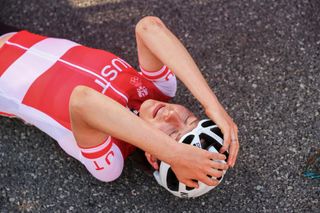Anna Kiesenhofer the anti-authoritarian 'mastermind' of her own Olympic glory
'On paper I’m an amateur, but cycling takes up a lot of space in my life'

Anna Kiesenhofer told us that she never expected this and that it still hadn’t sunk in, but her press conference as the new Olympic champion truly came to life when she was asked what advice she’d give young riders starting out in the sport.
"Don’t trust authority too much," she stated, without much of a pause for thought.
The Austrian’s whole cycling career has been a sort of anti-establishment exercise, and it seems to fit with the original ethos of the Olympic Games that a gold medal is currently hanging from the neck of someone who is technically an amateur.
Kiesenhofer, whose principal pursuit is mathematics, has not been part of a cycling team since she left Lotto Soudal in 2017, and nor did she rely much on her national federation in advance of these Olympic Games.
"I manage everything on my own," she said, explaining that she is entirely self-coached and that her game-plan for Tokyo - from nutrition and equipment to training and tactics - was entirely self-authored.
"I’m not the kind of cyclist who is only pushing the pedals; I’m also the mastermind behind my performance," she said. "I'm also proud of that."
Kiesenhofer’s independence stands in stark contrast to most of the riders she lined up alongside on Sunday morning, in particular the Dutch quartet that dominated the pre-race agenda.
Get The Leadout Newsletter
The latest race content, interviews, features, reviews and expert buying guides, direct to your inbox!
It was remarkable that such a decorated group of riders were upstaged by someone so unheralded, and amusingly apt that a miscalculation should direct the gold medal the way of the mathematician.
"There was a board showing the time gaps but I never knew if I could trust it,” Kiesenhofer said, in what was another hint of that anti-authoritarian streak.
But where does it come from?
"There’s always this danger – and I was victim of it myself – that you’re young, you don’t know too much, then you have some coach or someone who says ‘I know this and you have to do that, and it’ll work for you’. I was in that spot myself and I believed people," she explained.
"Now I‘m old, I’m 30, and I started to realise that all those people who say they know, they actually don’t know. Many of them don’t know, and especially those who say that they know, don’t know, because those who do know say that they don’t know."
The mistrust might not be limited to her experiences in cycling, since she competed in duathlons and triathlons before injuries steered her away from running in 2014. She caught the attention of Lotto Soudal with her results on the Spanish amateur circuit in 2016 but was completing her PHD at the same time and, after just a year at the Belgian squad, decided the professional echelon of the sport wasn’t for her.
"I started to realise there are no shortcuts, there are no miracles. So that’s really my advice - to not necessarily believe your coach. I mean, you need to trust some people, you need people around you, and you can’t do everything on your own, but you have to be very careful about who you trust,” she said.
"For me, right now, it’s my family and close friends. I know many friends are not real friends. The number of people I trust is quite limited because you think you trust someone but in the end, you realise they are talking behind your back. The few people I trust are very close to me."
That element of isolation meant that Kiesenhofer flew into Tokyo truly under the radar, and it was telling that the one thing the Dutch squad could agree on was that they completely underestimated the Austrian university lecturer.
Indeed, the failure to realise she was still out front only told part of the story, the rest being Kiesenhofer’s own strength in riding all day in the breakaway and then storming clear with a 40-kilometre solo while her former companions faded into the background.
She could never have dreamed up that golden scenario, but nor did she consider herself quite the rank outsider that she has perhaps been portrayed as.
"On paper, I’m an amateur, but cycling takes up a lot of space in my life. I don’t earn money… I mean not a lot, my income is like a normal job, but in my head cycling takes up a huge space. For the last one-and-a-half years, I was completely focused on today," she said.
"I sacrificed everything for today, for getting a good result. In my mind, a good result might have been 25th, and I was just sacrificing everything for 25th, so now to get the win, it’s such an incredible reward."
The big question now is what happens next, with the gold medal sure to open up a wealth of new possibilities.
Kiesenhofer will soon fly home to Austria to celebrate with her family and friends, and then it’ll be over to Lausanne to resume her duties as a researcher and lecturer at the Swiss Federal Institute of Technology.
"Let’s see. I don’t know. I think the main change might actually be in myself, in my character. This will give me a lot of self-confidence and self-belief," she said.
"I’m still unsure what will change on the outside. I will keep my job, I will continue riding as I did before this victory. Of course, in terms of self-confidence it has made me another person, I think."
Patrick is a freelance sports writer and editor. He’s an NCTJ-accredited journalist with a bachelor’s degree in modern languages (French and Spanish). Patrick worked full-time at Cyclingnews for eight years between 2015 and 2023, latterly as Deputy Editor.
Most Popular


